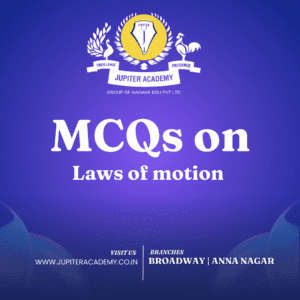NEET 2025: OMR Sheet Filling Tips to Avoid Mistakes Preparing...
Read MoreLaws of motion MCQs for NEET

Newton’s laws of motion are the fundamental laws that are used for describing the motion of the body. There are three laws of motion and they are as follows:
- An object continues to be in the state of uniform motion or in the state of rest unless an external force acts on it. (Also known as the law of inertia)
- Force is a product of mass and acceleration.
- For every action, there is an equal and opposite reaction. (Also known as conservation of momentum)

1. MCQ: According to Newton’s first law of motion, an object at rest will remain at rest, and an object in motion will continue in motion with the same speed and in the same direction unless acted upon by an external force. This property is known as:
a) Inertia
b) Acceleration
c) Momentum
d) Gravitation
Answer: a) Inertia
2. MCQ: Which of Newton’s laws of motion is also known as the “Law of Action and Reaction”?
a) Newton’s First Law
b) Newton’s Second Law
c) Newton’s Third Law
d) Newton’s Law of Universal Gravitation
Answer: c) Newton’s Third Law
3. MCQ: The SI unit of force is:
a) Joule
b) Newton
c) Watt
d) Kilogram
Answer: b) Newton
4. MCQ: When an object is in equilibrium, it means that:
a) It is stationary.
b) It has zero velocity.
c) The net force acting on it is zero.
d) Its mass is balanced.
Answer: c) The net force acting on it is zero.
5. MCQ: Which of the following is an example of projectile motion?
a) A ball rolling down an inclined plane.
b) A ball thrown horizontally from a height.
c) A ball attached to a string, swinging in a circular motion.
d) A ball bouncing on the ground.
Answer: b) A ball thrown horizontally from a height.
Please note that it’s essential to keep practicing and refer to updated study materials for the most accurate and relevant information for your NEET preparation. Good luck with your studies!

Laws of motion MCQs for JEE
1. MCQ: Which of the following statements is true regarding Newton’s second law of motion?
a) Acceleration is directly proportional to the applied force.
b) Acceleration is inversely proportional to the mass of the object.
c) Force is directly proportional to the displacement.
d) Force is inversely proportional to the square of the velocity.
Answer: a) Acceleration is directly proportional to the applied force.
2. MCQ: An object of mass 2 kg is subjected to a net force of 10 N. What will be its acceleration?
a) 5 m/s²
b) 8 m/s²
c) 10 m/s²
d) 20 m/s²
Answer: a) 5 m/s²
3. MCQ: According to Newton’s third law of motion, if object A exerts a force on object B, then:
a) Object B exerts a larger force on object A in the opposite direction.
b) Object B exerts a smaller force on object A in the opposite direction.
c) Object B exerts an equal force on object A in the opposite direction.
d) Object B exerts no force on object A.
Answer: c) Object B exerts an equal force on object A in the opposite direction.
4. MCQ: A force of 20 N is applied to an object of mass 5 kg. What will be the acceleration of the object?
a) 2 m/s²
b) 4 m/s²
c) 5 m/s²
d) 25 m/s²
Answer: a) 2 m/s²
5. MCQ: An object of mass 8 kg is moving with a constant velocity of 6 m/s. What is the net external force acting on the object?
a) 0 N
b) 8 N
c) 12 N
d) 48 N
Answer: a) 0 N
Please remember that the JEE syllabus and pattern might change over time, so it’s essential to refer to the latest JEE study materials and official practice papers for the most accurate and relevant preparation. Good luck with your JEE preparation!
TN Medical 2024 Counseling: Extension of Round 2 for MBBS & BDS
TN Medical 2024 Counseling: Extension of Round 2 for MBBS...
Read MoreTENTATIVE ROUND-II COUNSELLING SCHEDULE FOR ADMISSION TO MBBS/BDS
Registration Starts from 11-09-2024 10:00 A.M to 13-09-2024 05:00 P.M....
Read MoreLaws of motion MCQs for NEET
Laws of motion MCQs for NEET
Laws of motion MCQs for NEET
Laws of motion MCQs for NEET
Laws of motion MCQs for NEET
Laws of motion MCQs for NEET
Laws of motion MCQs for NEET
Laws of motion MCQs for NEET
Laws of motion MCQs for NEET
Laws of motion MCQs for JEE
Laws of motion MCQs for JEE
Laws of motion MCQs for JEE
Laws of motion MCQs for JEE




